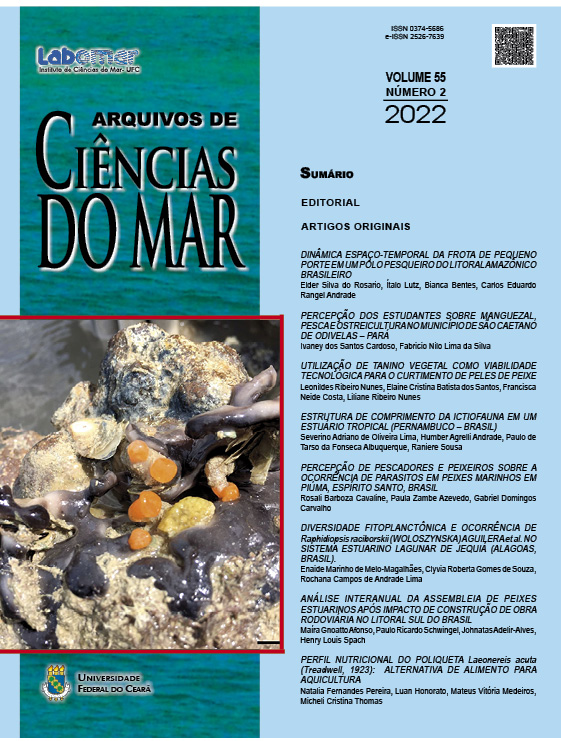Students’ perception about mangroves, fishing and oyster culture in the coastal area of paraense
DOI:
https://doi.org/10.32360/acmar.v55i2.78445Abstract
The objective of this work was to verify and analyze the students’ perception of mangroves, fishing and oyster farming in rural schools in the municipality of São Caetano de Odivelas, State of Pará (Brazil). The research was of a quantitative and qualitative nature, it took place during the months of April to June 2021, with 100 students from 10 basic education schools (final years of Elementary School), thus considering a case study. The collected data were analyzed using descriptive statistics. It turned out that the majority are girls aged between 12 and 14 years old, enrolled in the 9th grade classes. It was found that 87% of the students have family members linked to extractive and aquaculture activities, and with that, they have good perceptions of the mangrove and extractive activities. However, they have little knowledge about oyster farming. In the schools where they study, most have already participated in pedagogical activities focused on this theme, in the discipline of geography, however, in a punctuated way, aiming only at research and presentations. In
conclusion, there is a lack of dissemination of the theme in the schools surveyed in São Caetano de Odivelas. With this, there is a need to have an engagement of the theme to the curriculum of schools
through environmental education.
Keywords: environmental education, aquaculture, resume, field education.
Downloads
Downloads
Published
How to Cite
Issue
Section
License
1. Proposta de Política para Periódicos de Acesso Livre
Autores que publicam nesta revista concordam com os seguintes termos:
- Autores mantém os direitos autorais e concedem à revista o direito de primeira publicação, com o trabalho simultaneamente licenciado sob a Licença Creative Commons Attribution que permite o compartilhamento do trabalho com reconhecimento da autoria e publicação inicial nesta revista.
- Autores têm autorização para assumir contratos adicionais separadamente, para distribuição não-exclusiva da versão do trabalho publicada nesta revista (ex.: publicar em repositório institucional ou como capítulo de livro), com reconhecimento de autoria e publicação inicial nesta revista.
- Autores têm permissão e são estimulados a publicar e distribuir seu trabalho online (ex.: em repositórios institucionais ou na sua página pessoal) a qualquer ponto antes ou durante o processo editorial, já que isso pode gerar alterações produtivas, bem como aumentar o impacto e a citação do trabalho publicado (Veja O Efeito do Acesso Livre).

